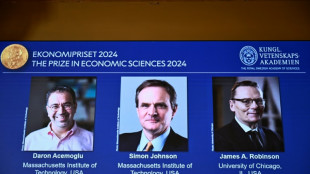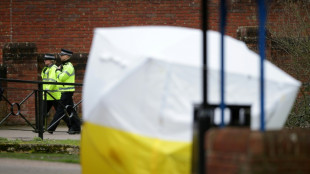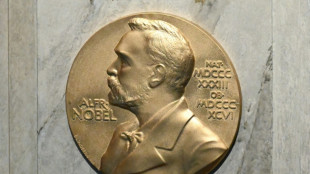-
 Football leagues, unions file EU complaint against FIFA in calendar dispute
Football leagues, unions file EU complaint against FIFA in calendar dispute
-
Nigeria boycott AFCON qualifier in Libya after 'inhumane treatment'

-
 India to recall top envoy to Canada: foreign ministry
India to recall top envoy to Canada: foreign ministry
-
Hezbollah, Israeli troops in 'violent clashes' after drone strike

-
 China insists won't renounce 'use of force' to take Taiwan as drills end
China insists won't renounce 'use of force' to take Taiwan as drills end
-
Painkiller sale plan to US gives France major headache

-
 Italy begins landmark migrant transfers to Albania
Italy begins landmark migrant transfers to Albania
-
'Unsustainable' housing crisis bedevils Spain's socialist govt

-
 New Zealand 4-0 up in America's Cup but British show signs of life
New Zealand 4-0 up in America's Cup but British show signs of life
-
Afghan Taliban vow to implement media ban on images of living things

-
 Russian prosecutor demands 3 years, 3 months jail for French researcher
Russian prosecutor demands 3 years, 3 months jail for French researcher
-
England ready for Pakistan's spin assault in second Test

-
 New Zealand's Ravindra excited for India Tests with father in crowd
New Zealand's Ravindra excited for India Tests with father in crowd
-
India's capital bans fireworks to curb air pollution

-
 FIFA to open 'global dialogue' on transfer system after Diarra ruling
FIFA to open 'global dialogue' on transfer system after Diarra ruling
-
Trio wins economics Nobel for work on wealth inequality

-
 Starmer vows to cut red tape as he urges foreign investors to 'back' UK
Starmer vows to cut red tape as he urges foreign investors to 'back' UK
-
'Not viable': Barcelona turns against surging tourism

-
 Hezbollah says targeted Israeli naval base after deadly drone strike
Hezbollah says targeted Israeli naval base after deadly drone strike
-
Rice praises 'unbelievable' England interim boss Carsley despite uncertainty

-
 Nepali teenager hailed as hero after climbing world's 8,000m peaks
Nepali teenager hailed as hero after climbing world's 8,000m peaks
-
England captain Stokes back from injury for second Pakistan Test

-
 Pakistan 'vigilantes' behind rise in online blasphemy cases
Pakistan 'vigilantes' behind rise in online blasphemy cases
-
Nearly 90, but opera legend Kabaivanska is still calling tune

-
 Smith experiment as Test opener over, Green out of India series
Smith experiment as Test opener over, Green out of India series
-
With inflation down, ECB eyes faster tempo of rate cuts

-
 Is life possible on a Jupiter moon? NASA goes to investigate
Is life possible on a Jupiter moon? NASA goes to investigate
-
Dodgers crush Mets 9-0 in MLB playoff series opener

-
 South Korea military says 'fully ready' as drone tensions soar
South Korea military says 'fully ready' as drone tensions soar
-
Cummins back, Marsh and Head out of Pakistan ODI series

-
 Shanghai stocks swing after stimulus briefing as most of Asia rises
Shanghai stocks swing after stimulus briefing as most of Asia rises
-
New Zealand's Latham promises 'no fear' as he takes charge for India Tests

-
 Kyrgios vows to 'shut up' doubters with December comeback
Kyrgios vows to 'shut up' doubters with December comeback
-
Public hearings start into death of Brit by Russian nerve agent

-
 Ex-Stasi officer faces verdict over 1974 Berlin border killing
Ex-Stasi officer faces verdict over 1974 Berlin border killing
-
Role of government, poverty research tipped for economics Nobel

-
 'Stolen satire' feeds US election misinformation
'Stolen satire' feeds US election misinformation
-
Rookie McCarty captures first PGA Tour title in Black Desert Championship

-
 Australia all-rounder Green ruled out of India Test series
Australia all-rounder Green ruled out of India Test series
-
Seeing double in Nigeria's 'twins capital of the world'

-
 UK FM to attend EU foreign affairs talks for first time in 2 years
UK FM to attend EU foreign affairs talks for first time in 2 years
-
Carter, Billups among 13 new Basketball Hall of Fame inductees

-
 Hezbollah drone strike kills four, wounds dozens at Israeli base
Hezbollah drone strike kills four, wounds dozens at Israeli base
-
China says launches military drills around Taiwan

-
 Stewart leads Liberty past Lynx to level WNBA Finals
Stewart leads Liberty past Lynx to level WNBA Finals
-
Ravens outlast Commanders while Bucs batter Saints in NFL

-
 Dozens hurt in Israel as Hezbollah claims drone strike
Dozens hurt in Israel as Hezbollah claims drone strike
-
England deserve 'world class' coach: Carsley

-
 Burkina Faso win to become first qualifiers for 2025 AFCON
Burkina Faso win to become first qualifiers for 2025 AFCON
-
AC Milan's Pulisic among five out for USA match in Mexico

Russian prosecutor demands 3 years prison for French researcher
A Russian prosecutor on Monday requested a sentence of three years and three months in a penal colony for a French researcher accused of breaching a "foreign agent" law.
The trial of Laurent Vinatier, who works for a Swiss conflict mediation NGO, comes amid tensions between Russia and the West over the Ukraine war.
The 48-year-old was arrested in Moscow in June and charged with collecting information on Russia's military without being registered as a "foreign agent", a crime punishable by up to five years in a penal colony.
A prosecutor told the judge that Vinatier should be found guilty and sentenced to "three years and three months to be served in a penal colony", as the researcher listened with head bowed.
Vinatier has acknowledged violating the Russian law, saying he was unaware he should have registered as a "foreign agent".
Wearing jeans and a pale blue shirt, he looked weary and subdued but gave a final speech in Russian, even quoting the national poet, Alexander Pushkin.
"I agree with the charge fully. I fully admit guilt," he said.
"I ask for a merciful and just sentence in the case," he added, apologising to Russia for breaking the law as well as to his NGO and family.
He read a poem by Pushkin titled "If life deceives you" with the lines that "the heart lives in the future: The present is desolate: everything is momentary, everything will pass."
The judge was due to announce the verdict at 1330 GMT.
The proposed sentence took into account that Vinatier "fully admitted guilt" and "repented for what he did" but also "significant threats connected to Russia's security", the prosecutor said.
Vinatier's lawyer Oleg Bessonov said the proposed sentence was "extremely harsh".
"Our client committed a crime for the first time in Russia... and fully admitted his guilt," the lawyer said, asking the judge to fine him instead.
The "foreign agent" law has been widely used to crack down on Kremlin critics but not usually foreign citizens.
French President Emmanuel Macron has demanded Vinatier's release, saying the "propaganda" against him "does not match reality".
Vinatier was charged over a requirement introduced in 2022 that people who collect information on Russia's military and arms that could harm country's national security, register as "foreign agents".
Russia has not charged or publicly accused Vinatier of espionage.
Tensions between Moscow and Paris are running high after France charged Russian-born Telegram founder Pavel Durov in August over illegal content on the popular social media platform, with the Kremlin warning against a "political persecution".
France has also strongly supported Ukraine in its fight against Russia's offensive and is training thousands of Ukrainian troops.
Vinatier is an adviser with the Geneva-based Centre for Humanitarian Dialogue, and is a veteran researcher on Russia and other post-Soviet countries.
The Centre "works to prevent and resolve armed conflicts around the world through mediation and discreet diplomacy", it says in a statement on its website.
- 'Love for Russia' -
According to sources interviewed by AFP, the Frenchman had been working for years on the conflict between Russia and Ukraine, before Russia launched its full-scale offensive in February 2022.
In his final speech in court, Vinatier said that he first visited Russia 20 years ago and decided to work there.
"I fell in love with Russia. My wife is Russian, my friends are Russian. I lived a Russian life, that's who I am," he said.
Russia has arrested several Westerners and charged them with serious crimes during its Ukraine offensive, which ruptured ties with the West.
Washington has accused Moscow of arresting US citizens on baseless charges to use them as bargaining chips to secure the release of Russians convicted abroad.
On August 1, Russia freed US reporter Evan Gershkovich, former US Marine Paul Whelan and more than a dozen others -- including Russian opposition politicians -- in its biggest prisoner swap with the West since the Cold War.
T.Resende--PC
